Gastroenterology and Hepatology Fellowship
The Saint Louis University Division of Gastroenterology and Hepatology has three outstanding fellowships: a three-year gastroenterology fellowship program to train future gastroenterologists and hepatologists, a one-year transplant hepatology fellowship, and a one-year clinical research fellowship. SLU fellows continue to have a 100% pass rate when they take their boards.
From the Program Director
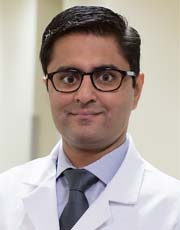
I joined Saint Louis University in July 2018, and have been actively involved in training as a faculty of the gastroenterology fellowship program. I served as an associate program director for the fellowship training from July 2021 to June 2023. I am greatly familiar with the rigors and rewards of training here at Saint Louis University. Our program’s goal is to create well-rounded gastroenterologists capable of meeting 21st-century needs in a collaborative approach with their patients, other services and the medical system. Fellows focus on clinical outpatient experiences, inpatient services, research and special populations. The fellowship program is positioned to grow with trainees and their interests, with our talented faculty and staff facilitating their instruction. Our union with SSM Health System has provided us with more resources and rigor to further enhance the mission of training and providing care to the community. Please check out some of the information about our dual-pathway fellowships.
If you have any questions, please don't hesitate to reach out.
Kamran Qureshi, M.D.
Associate professor
Program director
kamran.qureshi@health.slu.edu
Gastroenterology and Hepatology Training
During the program, fellows receive training in the cognitive aspects of consultative gastroenterology and hepatology, in gastrointestinal endoscopy and liver biopsies, and have research opportunities. Fellows also have an opportunity to spend six months in laboratory-based or clinical research. An amalgamation of these clinical, procedural and research experiences provides the foundation for a career in academic medicine and scholarly clinical practice.
The role of the gastrointestinal specialist has been modified with the changes in health care delivery and the advent of managed care. We are cognizant of these changes and have designed our program to be sufficiently flexible to meet our trainees' needs and allow for future success.
This includes creating the dual-pathway training option where a trainee will be board-eligible in both gastroenterology and transplant hepatology in only three years.
Complex problems in gastroenterology often require a team approach. We have excellent collaborative relations with GI and liver transplant surgeons, diagnostic and therapeutic radiologists, and GI pathologists who regularly interact with us in our patients' care and research efforts. As a result of this team approach, we are proud to offer the newly ACGME-approved dual-pathway training in our fellowship. This is an exciting opportunity for those interested in being board-eligible in gastroenterology and transplant hepatology. This combined program is designed to be completed in three years rather than as separate programs spanning four years. Saint Louis University has an active abdominal transplantation program.
Our teaching hospitals provide fellows with experience treating both common medical conditions seen in community settings and complex cases treated at a major academic tertiary care referral center. Our teaching faculty is an enthusiastic and skilled group of educators, including many who are listed on St. Louis's Best Doctors List. Our faculty and staff are known to be approachable, friendly, and supportive.
Fellows are regularly instructed at the bedside by dedicated clinical educators who provide a truly diverse and varied experience. Fellows develop excellent clinical and patient management skills that allow them to become outstanding physicians in any environment. The program fosters self-governance and ownership of the educational experience by the fellows, encouraging self-directed, lifelong learning.
During the first year of training, fellows rotate on the gastroenterology service at SSM Health Saint Louis University Hospital and John J. Cochran Veterans Hospital. Fellows become proficient in basic endoscopic procedures. Here is a yearly breakdown:
First Year
- GI Service at SSM Health Saint Louis University Hospital and John J. Cochran Veterans Hospital
- Proficient in basic endoscopic procedures including:
- Upper endoscopy
- Colonoscopy
- Endoscopic biopsy
- Polypectomy
- Esophageal dilation
- Endoscopic hemostasis
- Percutaneous endoscopic gastrostomy
Second and Third Year
- Liver service
- Pancreatiocobiliary service
- SLU clinics
- Endoscopy
- John J. Cochran Veterans Hospital
If a trainee is interested in completing the dual-pathway for gastroenterology and transplant hepatology, they may apply in their first year to begin on the adjusted pathway during their second year. These trainees will have the same robust gastroenterology experiences with the following transplant hepatology-specific experiences:
- Outpatient rotations with transplant surgery, pediatrics
- Pathology
- Participation in liver biopsies
- Participation in liver procurement
Elective Options
- Gastrointestinal radiology
- Pathology
- Pediatric and adolescent gastroenterology
- Advance endoscopy
- Hepatology
- Liver transplantation
- Colorectal surgery
- Academic leadership/teaching/QI project
Each fellow is expected to complete a research project of clinical or basic science interest. The goal of the research component of the fellowship is to train physicians and basic scientists who want to pursue a career in academic medicine. The program develops independence under the direction of a mentor.
A major emphasis of the experience is teaching the skills necessary to perform research and win peer-reviewed funding in our current competitive climate. The research process includes experience in literature review, study design, budgeting, peer review, IRB approval, data collection, statistical analysis, and submission of an abstract for society presentation and publication in a peer-reviewed journal. In addition to the support of the teaching faculty, the fellowship program provides research support consisting of clinical research assistants, computer programming for data analysis, and graphics and audio/visual support for presentations.
Each fellow must also present their research at our annual year-end research conferences. Fellows are also encouraged to present the results of their research experiences at an annual national meeting, such as those sponsored by the American Gastroenterological Association, the American Association for the Study of Liver Diseases or the American College of Gastroenterology.
Current research activities include:
- Investigation into the mechanisms of hepatic fibrogenesis
- Mechanism of lipotoxic liver injury (NASH)
- Gene regulation of hepatic collagen synthesis
- Regulation of hepatic stellate cell activation
- Effects of Kupffer cell products on hepatic stellate cells
- Role of oxidative stress in hepatic injury
- Mechanisms of inflammation and fibrosis in the pancreas
- Intracellular signaling in stellate cell
- Correlation of hepatic steatosis among cohabitants - NASH and pharmacology
- Effect of food-reintroduction timing post-scope
- Endoscopy for abnormal imaging
Training Goals
The goal of training in the second and third years is for fellows to develop specific skills in keeping with their career goals. Someone interested in general gastroenterology practice might be involved in all clinical areas. Someone interested in a research-oriented academic career would place an emphasis on research. And subspecialty residents interested in a career in academic clinical hepatology might do extensive work in the liver clinic, with the liver transplant service, and with several clinical research projects. The flexibility of the curriculum in the second and third years allows our fellows to tailor their training according to their career choices.
Transplant Hepatology
Our ACGME-accredited transplant hepatology fellowship is designed for trainees who have already completed their gastroenterology training. Building on the prior training allows this one-year fellowship to deepen the trainee’s knowledge while challenging them with additional skills and procedures. Our program aims to create well-rounded gastroenterologists capable of meeting 21st-century needs in a collaborative approach with their patients, other services and the medical system.
If you have any questions, please reach out and let us know.
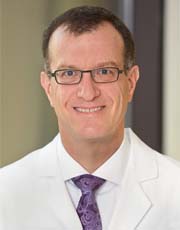
Alex Befeler, M.D.
Hepatologist
Professor
Medical director of liver transplantation
Program director, transplant hepatology
alex.befeler@health.slu.edu
Clinical Research Fellowship
Thank you for your interest in the unique clinical research fellowship offered by the Division of Gastroenterology and Hepatology at Saint Louis University. As a clinical research fellow (CRF), you will be an integral part of a dynamic team, reporting directly to the division director, Wing-Kin Syn, M.D.
Over the course of one year, you will be immersed in a unique blend of research and clinical training, with a specific focus on hepatology and mainly the areas of Metabolic Dysfunction-Associated Steatotic Liver Disease (MASLD), autoimmune liver disease and liver fibrosis. During this period, you will dedicate 50% of your time to cutting-edge research in hepatology. The division offers a rich array of ongoing research projects, giving you the opportunity to join groundbreaking initiatives. Moreover, the CRF will be strongly encouraged to design and lead their own research projects under the expert guidance of Syn or another attending physician.
The CRF will also have the distinct opportunity of being assigned co-investigator in clinical trials. This invaluable experience will empower you to develop strong clinical research skills and gain exposure to the leadership required to conduct strong and demanding prospective clinical studies.
To foster your professional growth and visibility, you will be expected to either present your studies’ findings at national and/or regional gastroenterology and hepatology society meetings, or publish your work in indexed journals. Additionally, you will be an active participant in all division conferences and teaching sessions, engaging with gastroenterology fellows and expanding your knowledge within a supportive community.
The other half of the academic year will be dedicated to clinical practice. You will have the privilege of participating in the general gastroenterology clinic, where you will see and evaluate up to eight patients per half-day, under the guidance of attending physicians. Moreover, you will have the opportunity to be part of the autoimmune liver disease and MASLD (metabolic) clinics for two half-days each week, delving deeper into specialized areas.
To augment CRF clinical experience, the fellow will have the chance to complete rotations in the inpatient services of general gastroenterology and hepatology, and get experience with invasive procedures such as endoscopic procedures, liver biopsies, and paracentesis.
The CRF will also play a vital role in the division's metabolic clinic program, assuming chief responsibilities and managing the schedule of rotating residents. Your dedication to teaching and providing guidance to students and young residents will further elevate your impact as a clinician and mentor.
This position is ideal for aspiring GI/hepatology physician-researchers or physician-scientists looking to forge a successful career in the field. The CRF program is meticulously designed to harmoniously integrate research and clinical practice, ultimately enhancing patient care and pushing the boundaries of medical knowledge.
For more information, please contact:
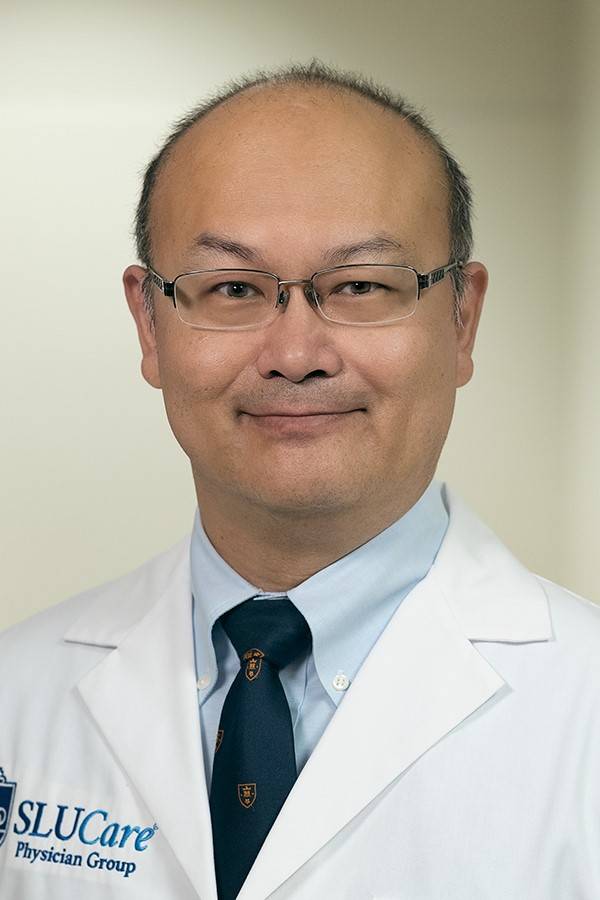
Wing-Kin Syn, M.D.
James F. King Chair in Gastroenterology
Program director, research track fellowship
wingkin.syn@health.slu.edu
Advanced Endoscopy Fellowship
This one-year program is designed to provide a comprehensive training experience in the evaluation and management of pancreaticobiliary conditions, among other GI disorders pertinent to the practice of advanced endoscopy.
At our high-volume tertiary center, the advanced endoscopy fellow will receive extensive training, utilizing cutting-edge equipment in our newly built endoscopy unit. This includes a wide range of advanced endoscopic techniques such as simple and complex ERCP, diagnostic and therapeutic EUS, endoscopic resection, enteral stenting, endoscopic closure therapy, and more.
The program aims to develop highly skilled endoscopists through hands-on training under the mentorship of our experienced faculty. Fellows will also have the opportunity to participate in multidisciplinary conferences and engage in clinical research.
Program Highlights:
- Procedural competence: Beyond advancing technical endoscopic skills, our program emphasizes gaining cognitive (knowledge and recognition) and integrative (expertise and behavior) competencies.
- Extensive experience: The high volume of cases at our referral center will ensure that trainees gain procedural competence and proficiency. The flexible nature of the program allows fellows to achieve procedural competence and proficiency in EUS and ERCP, while gaining insight into other advanced endoscopic procedures such as third space endoscopy and bariatric endoscopy.
- Multidisciplinary approach: To provide high-quality patient care, the advanced endoscopy fellow will actively interact and coordinate management with various specialists, including surgical and medical oncologists, transplant surgeons, expert GI pathologists, radiologists, interventional radiologists, and others.
- Our goal is to equip fellows with the skills and knowledge to excel in the field of advanced endoscopy, preparing them to meet the evolving needs in advanced endoscopy.
For more information, please contact:
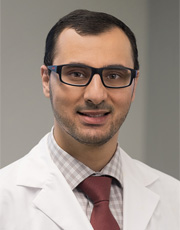
Advanced endoscopist
Assistant professor of internal medicine and gastroenterology
Program director, advanced endoscopy fellowship
wissam.kiwan@slucare.ssmhealth.com
Neurogastroenterology and Motility Fellowship
Thank you for your interest in the Neurogastroenterology and Motility Fellowship offered by the Division of Gastroenterology and Hepatology at Saint Louis University. As a neurogastroenterology and motility fellow in this specialized field, you will be an integral member of a dedicated team, reporting directly to the fellowship director, Adam Farmer, M.D. Ph.D.
During this one-year fellowship, you will engage in a unique mix and blended learning program of clinical and research training, focused on advancing understanding in neurogastroenterology and motility disorders. With approximately 20% of your time dedicated to research, you will contribute to ongoing studies in neurogastroenterology, GI motility disorders, and the gut-brain axis. This division offers a wide variety of research opportunities, allowing you to take part in high-impact projects and collaborate with experts. You will also be encouraged to design and lead your own research under the mentorship of Dr. Farmer or another experienced attending physician.
The fellowship includes the opportunity to serve as a co-investigator in clinical trials, which will enhance your research capabilities and provide firsthand experience in the leadership and coordination of complex, prospective clinical studies. To support your professional development, you will be encouraged to present your research findings at national or regional conferences and to publish your work in peer-reviewed journals. You will also participate in all division conferences and teaching sessions, benefiting from knowledge-sharing and discussions with gastroenterology fellows and faculty.
The remaining 80% of your fellowship will be devoted to clinical practice. Under the supervision of attending physicians, you will evaluate and manage patients in the general gastroenterology clinic, where you will develop experience in assessing a range of GI conditions. In addition, you will work in the motility clinic and neurogastroenterology specialty clinics for two half-days per week, where you will deepen your expertise in managing complex motility disorders and functional GI issues.
For a comprehensive clinical experience, you will have the chance to complete rotations in inpatient neurogastroenterology and motility services, gaining procedural experience in tests such as high-resolution manometry, pH monitoring, endoscopic procedures, and motility studies.
As the fellow you will also take on a leadership role in the neurogastroenterology clinic, coordinating with rotating residents and providing mentorship to students and junior trainees. This responsibility allows you to further develop your skills as both a clinician and educator, making a meaningful impact on those you guide. Ideal for physicians interested in specializing in neurogastroenterology and motility, this prestigious fellowship combines rigorous research and hands-on clinical practice to shape well-rounded physician-researchers.
For more information, please contact:
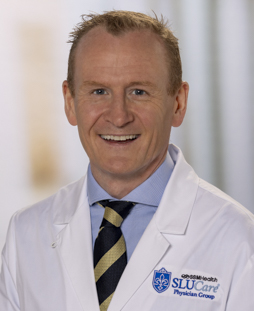
Adam D. Farmer, M.D., Ph.D.
Gastroenterologist
Professor of internal medicine
Director of neurogastroenterology and motility
adamdonald.farmer@ssmhealth.com
Application Process
You may apply for one of our four GI fellowship positions through the Electronic Residency Application Service (ERAS). We accept applications July 1-31 for each interview season. We review applications in early August and invite applicants to interview from late August to October. Our positions will be filled through the National Residency Match Program (NRMP). We sponsor both H-1B1 and J-1 visas. All application requirements are listed with ERAS.
Research
The Division of Gastroenterology and Hepatology at Saint Louis University fosters research from the lab to patient treatment. As a leading research center, we are continually engaged in multicenter clinical trials, allowing us to offer our patients access to the latest advances in clinical care. Our physicians specialize in diagnosing and treating liver diseases that range from the evaluation of fatty liver to hepatitis B to the management of severe, complicated, end-stage liver disease awaiting transplantation.
To learn about our clinical trials, please call the Gastroenterology and Hepatology Clinical Studies Unit at 314-977-9400 to speak with a research coordinator.